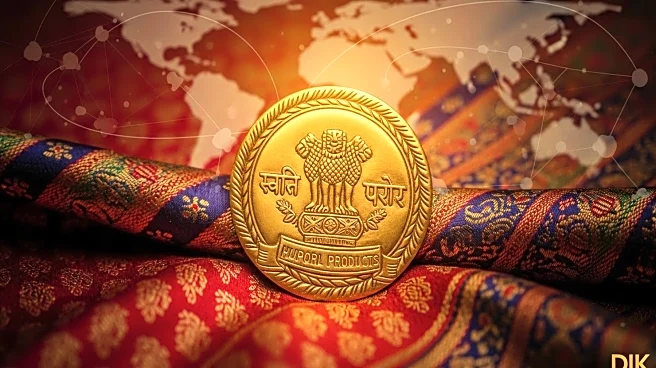What's Happening?
Indian Prime Minister Narendra Modi has publicly urged citizens to prioritize locally made products over foreign goods, as trade relations with the United States face challenges. This call comes after President Trump imposed a 50% tariff on Indian imports, prompting Modi to promote the 'Swadeshi' movement, which encourages the use of Indian-made goods. Campaigns have emerged to boycott popular American brands such as McDonald's, Pepsi, and Apple, which have a significant presence in India. Modi emphasized the importance of supporting local products to boost India's economic growth, particularly as the country prepares for consumer tax cuts. India's Commerce Minister Piyush Goyal is expected to visit Washington for trade discussions aimed at easing bilateral tensions.
Why It's Important?
The strained trade relations between India and the United States could have significant implications for both countries' economies. For India, the push towards local products may strengthen domestic industries and reduce reliance on foreign goods, potentially leading to increased economic self-sufficiency. However, American companies with substantial market shares in India could face reduced sales and market access, impacting their global revenue. The situation highlights the broader geopolitical dynamics and economic strategies that nations employ in response to trade disputes. The upcoming visit by India's Commerce Minister to Washington may be crucial in negotiating terms that could alleviate tensions and foster more favorable trade conditions.
What's Next?
India's Commerce Minister Piyush Goyal's visit to Washington is anticipated to be a pivotal moment in addressing the trade tensions between the two countries. The discussions may focus on finding common ground and negotiating tariff reductions or exemptions that could benefit both nations. Additionally, the Indian government's emphasis on local products may lead to policy changes that further support domestic manufacturing and retail sectors. The outcome of these talks could influence future trade agreements and economic strategies, potentially setting a precedent for how India and the U.S. handle trade disputes.
Beyond the Headlines
The advocacy for local products by Prime Minister Modi also touches on cultural and nationalistic sentiments, encouraging citizens to support Indian identity and self-reliance. This movement may foster a sense of pride and unity among Indians, while also challenging the dominance of foreign brands in the market. The shift towards local products could lead to long-term changes in consumer behavior and market dynamics, influencing how global companies strategize their operations in India.










